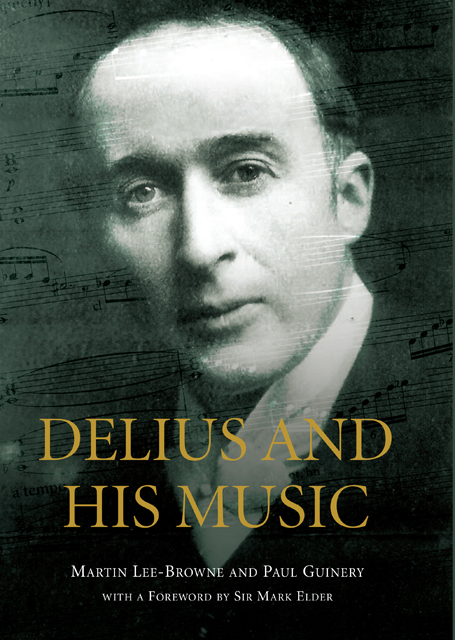Book contents
- Frontmatter
- Contents
- List of Illustrations
- List of Sources and Abbreviations
- Foreword by Sir Mark Elder, CBE
- Preface
- Chapter 1 1862–1888 Youth
- Chapter 2 1888–1892 The Young Composer in Paris
- Chapter 3 1893–1901 Coming to Maturity
- Chapter 4 1902–1905 The Great Noontide and Beecham
- Chapter 5 1906–1910 Acceptance and Friends
- Chapter 6 1911–1914 Inspiration Unabated
- Chapter 7 1915–1918 Winding Down
- Chapter 8 1919–1934 Fenby and the Last Years
- Chapter 9 The Songs
- Chapter 10 1934 and After
- Appendix 1 Delius’s Works in Chronological Order
- Appendix 2 Delius’s Diploma and Reports from The Leipzig Conservatorium
- Appendix 3 Programmes for the 1929 and 1946 Delius Festivals
- Selected Further Reading
- Index
Chapter 1 - 1862–1888 Youth
Published online by Cambridge University Press: 24 February 2023
- Frontmatter
- Contents
- List of Illustrations
- List of Sources and Abbreviations
- Foreword by Sir Mark Elder, CBE
- Preface
- Chapter 1 1862–1888 Youth
- Chapter 2 1888–1892 The Young Composer in Paris
- Chapter 3 1893–1901 Coming to Maturity
- Chapter 4 1902–1905 The Great Noontide and Beecham
- Chapter 5 1906–1910 Acceptance and Friends
- Chapter 6 1911–1914 Inspiration Unabated
- Chapter 7 1915–1918 Winding Down
- Chapter 8 1919–1934 Fenby and the Last Years
- Chapter 9 The Songs
- Chapter 10 1934 and After
- Appendix 1 Delius’s Works in Chronological Order
- Appendix 2 Delius’s Diploma and Reports from The Leipzig Conservatorium
- Appendix 3 Programmes for the 1929 and 1946 Delius Festivals
- Selected Further Reading
- Index
Summary
When Delius was born, in 1862, music-making was flourishing in England – in cathedrals, churches, town halls, village halls and private houses. On the other hand, it was 167 years since the death of the last English composer of real note, Henry Purcell (1659–95), and the most highly regarded composers in the second half of the nineteenth century were probably Sir George Smart (1776–1869); Sir Alexander Macfarren (1813–87), who wrote a vast amount of music, including nine symphonies and twenty-four operas; Sir William Sterndale Bennett (1816–75), whose best music was for the piano; and Sir John Stainer (1840–1901), most of whose work was religious and included the wellknown oratorio The Crucifixion. By today’s standards, however, their music was at best only competent and mildly interesting. Their better works can be enjoyable on an occasional hearing, but there is no question of their having the stature of their Continental counterparts: in Germany, Brahms, Bruckner, Wagner and Liszt; in France, Fauré, Bizet, Saint-Saëns and Franck; and, in Russia, Rimsky-Korsakov, Tchaikovsky, Musorgsky, Balakirev and Borodin – a good number of whom were well advanced in their careers, and writing some of their finest works.
The well-known gibe referring to England as being Das Land ohne Musik (The Land without Music) probably dates from the mid-1880s. At that time, however, the astonishing English Musical Renaissance is generally considered to have started – with the premiere of the thirty-two-year-old Hubert Parry’s ‘dramatic cantata’ Scenes from Shelley’s ‘Prometheus Unbound’ at the 1880 Gloucester Three Choirs Festival; when Hans Richter conducted the first performance of Elgar’s Variations on an Original Theme (‘Enigma’) in London’s St James’s Hall on 19 June 1899, it could be said with true certainty that English music was at long last alive and well again. The style was still very Germanic – but from the mid-1880s, three young composers, two English and one French, began writing music that was completely different from anything that had ever been heard before. Little of it owed anything to the old forms: it was full of new harmonies, new choral and orchestral sounds, using a wider range of metre (although always with an underlying musical pulse), and it mirrored the rise of the Impressionist school of painting. They were Ralph Vaughan Williams, Frederick Delius and Claude Debussy.
- Type
- Chapter
- Information
- Delius and his Music , pp. 1 - 25Publisher: Boydell & BrewerPrint publication year: 2014



